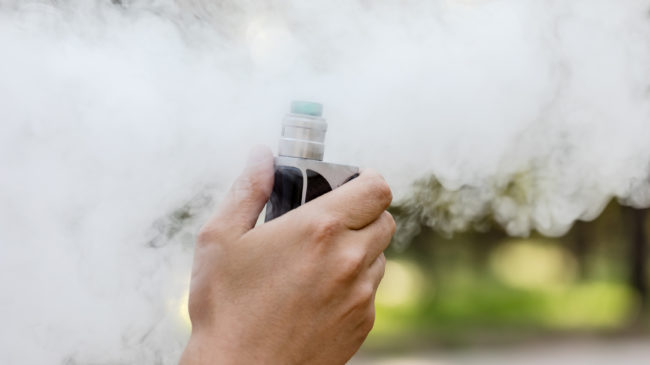With the U.S. devastated by more than 120,000 coronavirus deaths, many tobacco controllers are making sure not to let a crisis go to waste. Despite absolutely no scientific evidence suggesting that e-cigarettes increase one’s susceptibility of contracting coronavirus, government officials in states like New York have used the pandemic to justify banning all flavored vaping products. It’s a sad development because flavored vaping products are the most promising devices to reduce the millions of deaths caused by cigarette smoking.
Although the coronavirus has been characterized as a once-in-a-century pandemic, cigarette smoking will likely still contribute to many more deaths than coronavirus this year and many years to come. The Centers for Disease Control and Prevention (CDC) estimate that cigarette smoking kills nearly 500,000 Americans every year, which is more than twice the White House’s worst-case fatality projection (that it made at the end of March) of 240,000 deaths from coronavirus.
Gov. Andrew Cuomo has been battling the New York courts to ban flavored e-cigarettes since last year, but misinformation surrounding the current coronavirus pandemic promulgated by certain officials and New York Lt. Gov. Kathy Hochul finally persuaded state legislators to pass the ban. New York is now the fourth state to outlaw flavored vaping products, and other states, like Washington, might soon follow this dangerous precedent.
Studies from JAMA Network Open, The BMJ, Annals of Internal Medicine, and the New England Journal of Medicine all report e-cigarettes are substantially safer to use than combustible cigarettes, and Public Health England concludes e-cigarettes are at least 95 percent safer to consume than combustible cigarettes. The aforementioned study in The BMJ estimates if every adult cigarette smoker switched to vaping in the U.S., approximately 6.6 million fewer Americans would die premature deaths.
With such unanimous research showing the health advantages of vaping over smoking, public health officials in America should be utilizing, not demonizing, flavored e-cigarettes in their efforts to reduce smoking, just as the United Kingdom is doing. In fact, countries hardest hit by the coronavirus, like Italy, Spain, and France, have kept their vape shops open throughout the pandemic, with no restrictions on flavors. After all, foreign health departments recognize vaping’s potential to reduce smoking-related fatalities and how flavors are a significant incentive for many smokers to switch away from cigarettes.
Unfortunately, many medical groups in America are lobbying public officials to ban flavored vaping products. The New York State Academy of Physicians, for instance, has gone as far as supporting a total ban on all tobacco products, despite current Centers for Disease Control and Prevention (CDC) data showing smokers are actually underrepresented among coronavirus patients and hospitalizations. The lack of evidence justifying tobacco prohibitions is staggering, but this sort of unsubstantiated advice isn’t the first.
For example, in February, Surgeon General Jerome Adams told Americans to stop buying masks, arguing they don’t prevent exposure to SARS-CoV-2, the virus causing coronavirus. As it turns out, masks are the most important personal protective equipment the general public can use to help prevent COVID-19 exposure, but the surgeon general argued otherwise when the national case count was still low, in an apparent effort to reserve masks for health care workers.
The public should be wary of so-called expert advice on vaping. This is evident in the surgeon general’s own report on smoking cessation, which alleges “the evidence is inadequate to infer that e-cigarettes, in general, increase smoking cessation.” However, in the same report, Adams cites a New England Journal of Medicine randomized-controlled study showing e-cigarettes are twice as effective as current Food and Drug Administration-approved tobacco cessation products to help smokers quit cigarettes.
Now, federal health officials are joining New York to ignore vaping’s benefits and to suggest e-cigarettes are a risk factor for contracting coronavirus. The director of the National Institutes on Drug Abuse, Nora Volkow, is postulating chronic obstructive pulmonary disease (COPD) might be a risk factor for coronavirus and vaping might be linked to COPD, so vaping might increase risk for contracting coronavirus. This warning doesn’t acknowledge there’s no evidence linking vaping to COPD, but Volkow also seems to have missed the recent research from The Lancet showing COPD-like comorbidities are actually underrepresented among coronavirus patients. Members of Congress are also leveraging such claims to call for a complete prohibition on vaping to combat the virus, which would only escalate the current public health tragedy.
There’s no research supporting the public health justifications being used to ban e-cigarettes amid the coronavirus pandemic, but, unfortunately, that doesn’t seem to matter. A lot of tobacco controllers aren’t interested in public health compromises—many want to ban as many products as possible in order to move closer to total tobacco prohibition, regardless of overall harm. No response to a public health crisis is perfect, but our institutions should not use issue bad guidance and rules that cause more harm than good.
A version of this column previously appeared in The National Interest.

